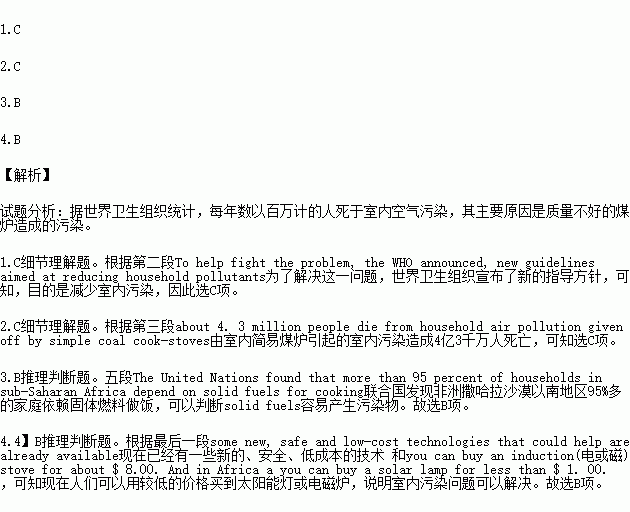题目内容
The World Health Organization warns that millions of people are dying every year from indoor air pollution. The WHO finds that poor cooking, heating and lighting technologies are killing millions of people each year.
Indoor air pollution results from the use of dangerous fuels and cook-stoves in the home. To help fight the problem, the WHO announced, new guidelines aimed at reducing household pollutants.
WHO officials say nearly three billion people are unable to use clean fuels and technologies for cooking? heating and lighting. And they say more than seven million people die from exposure to indoor or outdoor air pollution each year. Of that number, the WHO says about 4. 3 million people die from household air pollution given off by simple coal cook-stoves. Most of the deaths are in developing countries.
Carlos Dora is Coordinator in the WHO's Department of Public Health, Environmental and Social Determinants of Health. He says people should not use unprocessed coal and kerosene fuel indoors. He says opening a window or door to let out the harmful air will not improve the situation. It will only pollute the outdoors.
WHO officials say indoor pollution leads to early deaths from stroke, heart and lung disease, childhood pneumonia(肺炎) and lung cancer. Women and girls are the main victims. The United Nations found that more than 95 percent of households in sub-Saharan Africa depend on solid fuels for cooking. It says huge populations in India, China and Latin American countries, such as Guatemala and Peru, are also at risk.
Nigel Bruce is a professor of Public Health at the University of Liverpool. He says researchers are developing good cook-stoves and other equipment to burn fuels in a more efficient way.
WHO experts note some new, safe and low-cost technologies that could help are already available. In India, you can buy an induction(电磁) stove for about $ 8.00. And in Africa a you can buy a solar lamp for less than $ 1. 00.
1.What has been done to reduce indoor air pollution?
A. The WHO provided selfless assistance for the poor.
B. People are forbidden to use coal-stoves inside.
C. The WHO issues official advice to cut down pollution,
D. People are taught how to correctly use their stoves.
2.According to WHO officials, we can know that
A. many people refuse to use clean fuels and technologies
B. seven million people die from indoor air pollution
C. simple coal cook-stoves cause too many deaths
D. the processed coal is dangerous to people’s heath
3.It can be concluded from the fifth paragraph that .
A. most children are suffering a lot from lung cancer
B. solid fuels are easily producing pollutants
C. sub-Saharan Africa is the poorest place
D. some countries are at the risk of using up fuels
4.What can we infer from the passage?
A. More and more will die in the future.
B. It is not hard to solve indoor air pollutants.
C. Most people cannot afford a new stove.
D. The WHO will take strong measures.

